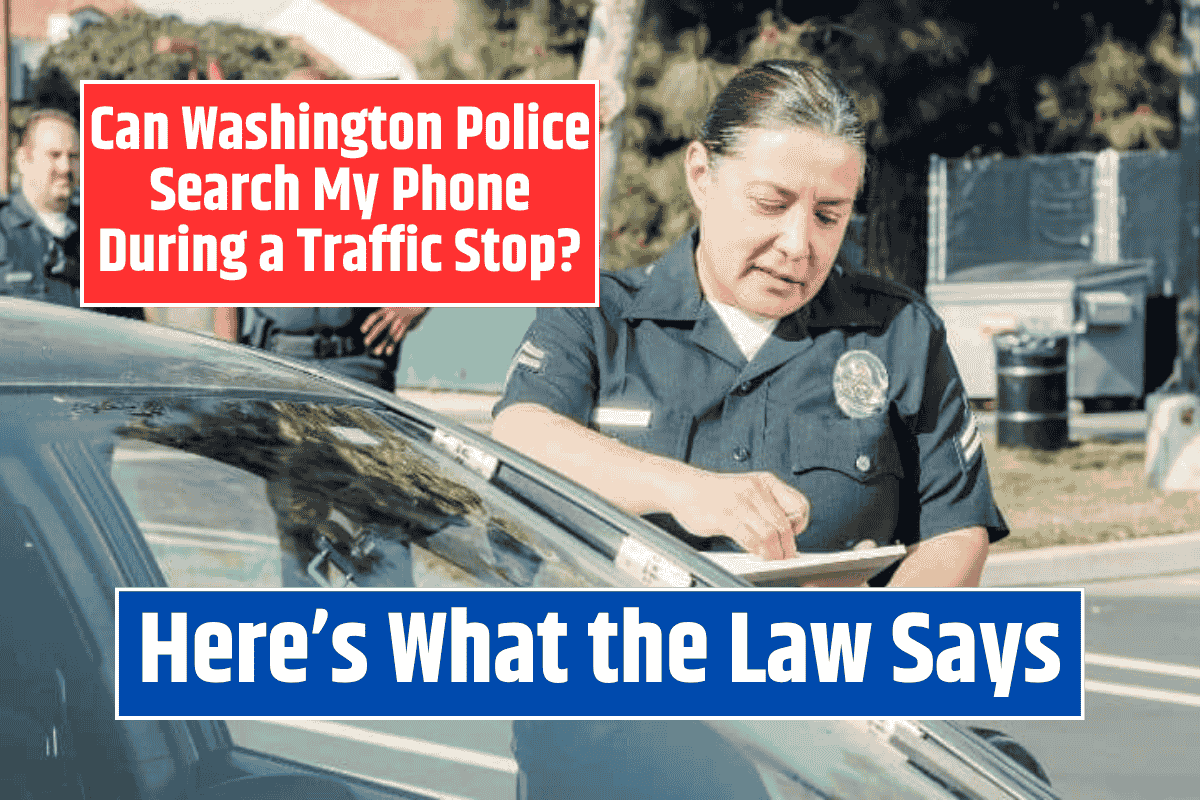If you’re pulled over by police in Washington State, it’s natural to worry about your rights—especially when it comes to your phone. After all, your phone stores personal messages, photos, contacts, banking info, and even your location history.
So, can police in Washington search your phone during a traffic stop without your permission? Let’s break it down in simple terms so you know your digital privacy rights.
Your Phone Is Protected by the Fourth Amendment
The Fourth Amendment of the U.S. Constitution protects you from unreasonable searches and seizures. That includes your phone and everything on it.
In 2014, the U.S. Supreme Court made it clear in the Riley v. California decision that police must get a warrant to search your phone—even if you’re arrested. This means police can’t just scroll through your messages or photos because they pulled you over.
What Washington Law Says
In Washington, your digital privacy is taken seriously. Under both federal and state law, your phone cannot be searched during a traffic stop unless:
1. You Give Voluntary Consent
If you tell police they can look at your phone, they legally can. But here’s the key point: you don’t have to say yes. If you’re unsure, you can politely say, “I do not consent to a search of my phone.” This is your right.
2. They Have a Search Warrant
A warrant must come from a judge and must clearly describe what police are allowed to look for on your device. Without one, any search of your phone’s contents is illegal—unless you gave consent or there’s an emergency.
3. There Are Exigent (Emergency) Circumstances
This is rare, but if police believe someone is in immediate danger, or they’re trying to prevent the destruction of critical evidence, they might search your phone without a warrant. However, courts carefully examine these situations, and if it wasn’t a real emergency, any evidence found may not be allowed in court.
4. The Phone Is Abandoned
If you leave your phone behind, toss it away, or deny it’s yours, a court might say you gave up your right to privacy. In that case, police may legally search it without a warrant. But this doesn’t apply if you just forget your phone or don’t respond right away—there must be clear signs of abandonment.
5. You’re Under Arrest (But They Still Need a Warrant)
Even if you’re arrested, police cannot search your phone without a warrant. They can take the phone and keep it safe as evidence, but they’re not allowed to unlock or browse through it without permission from a judge.
Can Police Search Your Vehicle and Then Your Phone?
In some cases, if police believe your car contains evidence of a crime (like drugs or illegal weapons), they can search the vehicle under the “probable cause” rule.
But this doesn’t give them the right to go through your phone. Phones are considered much more private, and a separate warrant is required.
What Should You Do If Police Ask for Your Phone?
If you’re pulled over and police ask to see your phone, remember:
Stay calm and polite.
Say clearly, “I do not consent to a search of my phone.”
Do not unlock your phone or hand over your passcode.
Do not physically resist—just calmly assert your rights.
If they continue to pressure you, say, “I would like to speak to a lawyer.”
Note the officer’s name, badge number, and time of the stop if possible.
Your Rights in Washington Are Strong
Washington is one of the few states that goes further than federal rules in protecting digital privacy. Courts in the state have repeatedly ruled that police must follow strict legal procedures to search someone’s phone.
The Washington State Constitution even gives stronger privacy protections than the U.S. Constitution in many situations.
In Washington, your phone is not just another item in your pocket—it’s a highly protected source of personal information. Police cannot search it without a warrant or your permission, even if you’re pulled over or arrested. While there are some exceptions, like emergencies or if you abandon the phone, the law is on your side.
If you ever feel your rights were violated, speak to an attorney right away. Knowing your rights ahead of time can help you stay calm and protected during any police interaction.
[1] https://law.lis.virginia.gov/vacode/title19.2/chapter5/section19.2-59/
[2] https://www.washingtonpost.com/technology/2024/10/08/can-police-search-your-phone/
[3] https://www.kingcampbell.com/blog/2021/december/can-police-search-your-phone-in-virginia-/












